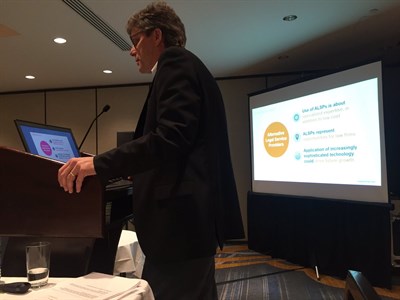Several interesting surveys have been presented at LegalTech 2017, such as ILTA’s 2016 Technology Survey and the ALSP report by Thomson Reuters’ Legal Executive Institute, The Center for the Study of the Legal Profession at Georgetown University Law Center and the Saïd Business School at the University of Oxford.
The ILTA Technology Survey showed that change is the new normal and highlighted some of the 440 responding firm’s changed priorities and expectations on technology as well as changes in team structure and size, changes in budgets. The ILTA panel also presented some practical examples of innovative technology projects they had conducted during the past year to improve their firms’ service delivery, in line with the survey results.

Some on the notable findings in the report were that 84% of the firms now have moved 75% or more of their IT solutions to virtualized servers and that 62% of the firms are increasing their cloud based solutions. “Cloud” was also the most significant trend identified for the legal profession for the next three to five years. Technology has also reduced the support staff to attorney rate from 1.5 to 1.2 during the past ten years.
The research study on the emergence of alternative legal service providers, presented by David Curle, Director of Strategic Competitive Intelligence for Thomson Reuters Legal, showed that the growing use of ALSPs is no longer solely about low cost, but also about expertise. ALSPs represent opportunities – a source of partnership rather than a competitor – for many law firms. In addition, ALSPs are about technology and not just labor arbitrage, providing access to expertise systems and sophisticated technology. Alma Assay, Allegory, on the session panel commented on the report that ALPs can help with “inputs” so software user can focus on output.

(Photo by Alma Assay.)
According to the report 51% of the responding law firms and 60% of the responding legal departments use ALSP and expect the use to increase further.
Law departments use ALSPs mostly in specialized areas like regulatory risk and compliance services, legal research, and IP management, giving them access to expertise not available within the department. Law firms, meanwhile, use ALSPs mostly for e-discovery, document review and litigation support and investigation, to help firms mitigate price pressure, help scale and expand the business and help the firm differentiate its service.
The full report is available for download here: The 2017 Alternative Legal Service Study
Read all our posts from LegalTech 2017:

